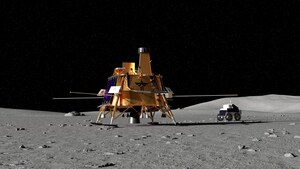HAMPTON, Va., June 17 /PRNewswire-USNewswire/ -- Future astronauts may some day explore the surface of other planets thanks to ideas developed by university students.
(Logo: http://photos.prnewswire.com/prnh/20081007/38461LOGO)
(Logo: http://www.newscom.com/cgi-bin/prnh/20081007/38461LOGO)
Nineteen graduate and undergraduate teams competed in the 2010 Revolutionary Aerospace Systems Concepts Academic Linkage (RASC-AL), a contest that challenges college students to solve real-life space exploration challenges. More than 120 students made it to the finals of this year's competition, sponsored by NASA and the National Institute of Aerospace (NIA), held during a three-day forum June 6-9 in Cocoa Beach, Fla.
Students from the Massachusetts Institute of Technology, Cambridge, Mass., Arizona State University, Tempe, Ariz. and the University of Maryland in College Park, Md., took first place honors for their projects and presentations on how best to get astronauts and robots to the moon and Mars.
"Some of the team's ideas were really amazing – creative and well-engineered," said Pat Troutman, senior systems analyst at NASA's Langley Research Center in Hampton, Va. "If the winners are any indication of the kind of talent coming out of engineering schools - NASA and the country's future will be in good hands."
Winning teams competed against other university teams from Georgia Tech in Atlanta, Colorado School of Mines, Golden, Colo., Princeton University in Princeton, N.J. and a team from Uruguay, which was the first time an international team competed in the forum. The competition challenged teams competing in separate graduate and undergraduate divisions to consider and then design projects that could become part of real space exploration.
Massachusetts Institute of Technology won first prize in the graduate division for its project, "Shared Human and Robotic Landing and Surface Exploration in the Neighborhood of Mars." Team members included Phillip Cunio, Babk Cohanim, Benjamin Corbin, Christopher Han, Ephraim Lanford and Howard Yue. Prof. Jeffrey Hoffman served as the team's advisor.
First place in the undergraduate division went to the collaborative team from the University of Maryland and Arizona State University for their project called, "Project RAVEN: Robotic Assist Vehicle for Extraterrestrial Navigation." Team members present at the forum included Andrew Britton, Kevin Buckley, Jennifer Donaldson, Brandon Hall, Laura Meyer, Matthew Smith, and professor advisors, Dave Akin, Srikanth Saraipalli, and Mary Baldwin.
Second place honors went to the collaborative team of Georgia Tech and University of Virginia, Charlottesville, Va., in the graduate division and to the University of Colorado, Boulder, Colo., team in the undergraduate division.
Teams selected to participate in the forum submitted an abstract of their ideas and then once selected, submitted a final paper and gave an oral presentation. Teams networked with other universities and industry experts, toured NASA's Kennedy Space Center and participated in forum activities.
"We received a record number of applications for this year's RASC-AL competition," said Dr. Bernard Grossman, NIA's vice president for education and outreach. "The projects presented at the forum showed that this next generation of engineers are ready to move us forward in the future of space exploration."
An independent panel of space exploration experts from NASA, industry and the academic community judged the entries. Teams scored points based on their final paper, oral presentations, outreach service and technicality and real-life concepts of the project.
For more information about the 2010 Revolutionary Aerospace Systems Concepts Academic Linkage competition please go to:
For additional information about NASA, visit:
For additional information about the National Institute of Aerospace, visit:
NASA Langley press releases are available automatically by sending an e-mail message to with the word Subscribe in the subject line. You will receive an e-mail asking you to visit a link to confirm the action. To unsubscribe, send an e-mail message to with the word Unsubscribe in the subject line.
SOURCE NASA
WANT YOUR COMPANY'S NEWS FEATURED ON PRNEWSWIRE.COM?
Newsrooms &
Influencers
Digital Media
Outlets
Journalists
Opted In






Share this article